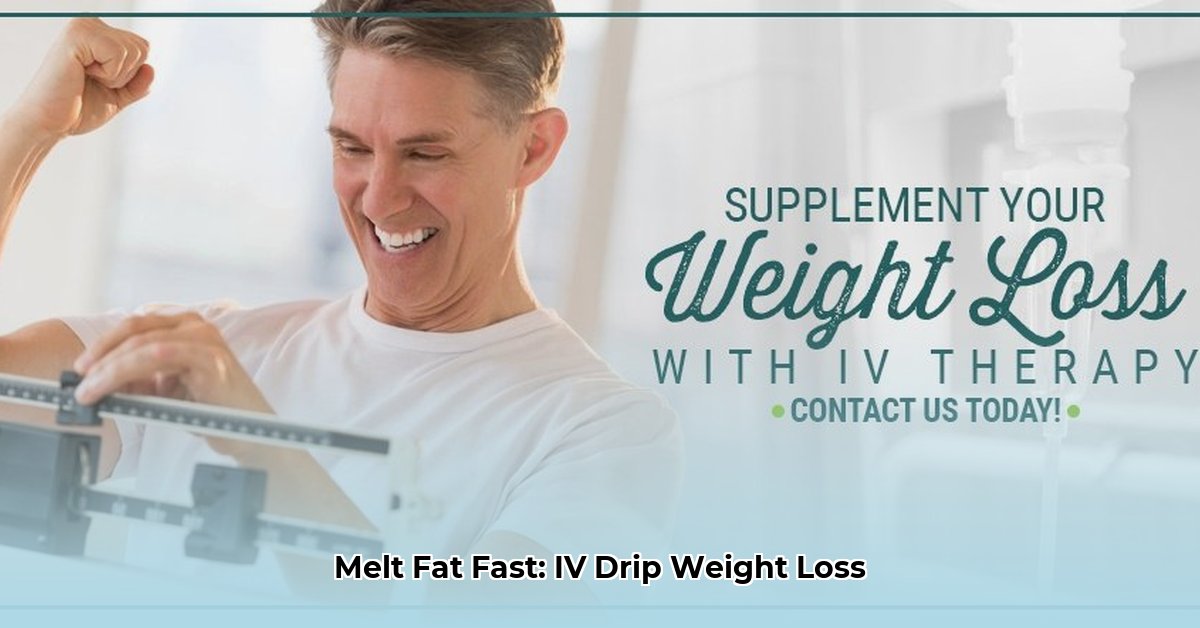
How IV Therapy Might Help You Lose Weight
IV therapy for weight loss delivers vitamins and minerals directly into your bloodstream, bypassing digestion. The theory is that this rapid nutrient delivery might boost your metabolism and energy levels, potentially aiding weight loss. Common ingredients include B vitamins (essential for energy production), L-carnitine (potentially aids fat burning), taurine (an amino acid with metabolic roles), and lipotropic agents (support liver function and fat metabolism). However, it's crucial to understand this is supportive therapy, not a standalone solution. Does IV therapy help you burn more calories? Research is still ongoing, and its impact on weight loss compared to diet and exercise alone remains inconclusive.
What to Expect During an IV Drip Session
Before your first session, a healthcare provider will conduct a thorough health assessment to ensure your suitability for IV therapy. The procedure involves inserting a small IV line into a vein, usually in your arm, followed by a 30-60 minute infusion of the chosen nutrient solution. You might feel a slight pinch during insertion, but the process is generally comfortable. Most people can resume normal activities immediately afterward. What are the typical side effects? Are there any potential risks? Let's address them below.
Different IV Drips for Weight Loss: A Detailed Look
IV drips vary in their formulations. Some clinics offer pre-mixed solutions, like the Myers' Cocktail (a blend of vitamins and minerals), while others customize blends based on individual needs. Key components often include:
- B Vitamins: Essential for energy and metabolism. Deficiencies can hinder weight loss.
- L-Carnitine: May aid fat burning, but more research is needed.
- Taurine: An amino acid involved in numerous metabolic processes.
- Lipotropic Agents (Choline, Inositol, Methionine): Support liver function, crucial for fat processing.
Always discuss the specific ingredients and potential benefits with your healthcare provider.
Does IV Therapy for Weight Loss Actually Work? A Critical Review of the Evidence
While many report positive experiences, robust scientific evidence supporting significant weight loss from IV therapy alone is limited. While the rapid nutrient delivery might offer advantages over oral supplements, large-scale studies directly comparing IV therapy to other weight loss methods are lacking. Dr. Anya Sharma, MD, a leading nutritionist at the University of California, San Francisco, states, "Current research hasn't established IV therapy as a superior weight-loss method compared to a balanced diet and regular exercise. It might offer supplementary benefits, but shouldn't replace fundamental lifestyle changes." This highlights the need for further research to establish its true effectiveness.
Potential Risks and Side Effects: A Balanced Perspective
While generally safe, IV therapy carries potential risks:
- Injection site reactions: Mild bruising, swelling, or redness are possible.
- Allergic reactions: Though rare, allergic reactions to the IV fluids or ingredients can occur.
- Electrolyte imbalances: Unlikely with proper monitoring and formulation.
It's crucial to inform your provider of any allergies or health conditions before treatment. Choosing a reputable clinic with experienced professionals minimizes these risks. What percentage of patients experience complications? While precise figures are hard to find in current literature, reputable clinics maintain low complication rates.
Cost and Affordability: A Realistic Assessment
IV therapy's cost varies significantly based on location, clinic, and formulation. It's often more expensive than other weight loss approaches like diet and exercise. Consider the overall cost and compare it to potential benefits before making a decision. How much does IV therapy cost? This can range from hundreds to thousands of dollars per treatment.
Who Should (and Shouldn't) Consider IV Therapy?
Healthy individuals already committed to lifestyle changes may benefit from IV therapy as a supplementary tool. However, it's not suitable for everyone. Individuals with certain medical conditions, such as kidney disease, or those on specific medications should consult their doctor. Is IV therapy right for you? A consultation with a healthcare professional will provide personalized guidance.
Integrating IV Therapy into a Holistic Plan: A Step-by-Step Guide
For sustainable weight loss, combine IV therapy (if chosen) with a holistic approach:
- Balanced Diet: Focus on whole, unprocessed foods.
- Regular Exercise: Aim for at least 150 minutes of moderate-intensity aerobic activity weekly.
- Sufficient Sleep: Get 7-9 hours of quality sleep nightly.
- Stress Management: Practice stress-reduction techniques.
Remember, IV therapy is a support tool within a comprehensive approach.
Finding a Reputable Provider: Your Checklist
Choosing the right clinic is crucial. Look for:
- Licensed medical professionals (doctors or registered nurses)
- Experience in administering IV therapy
- Positive reviews and testimonials
- Adherence to safety and sanitation protocols
Don't hesitate to ask questions and verify credentials.
Conclusion: Informed Decisions for Sustainable Weight Loss
IV therapy offers a potential supplementary approach to weight loss by improving nutrient absorption and energy levels. However, it's not a standalone solution. Sustainable weight loss requires a holistic approach that combines healthy habits with responsible medical interventions. Always consult with your doctor or a registered dietitian to make an informed decision that aligns with your individual health needs and goals. Is IV therapy the right choice for you? The answer lies in careful consideration and thoughtful discussion with healthcare professionals.